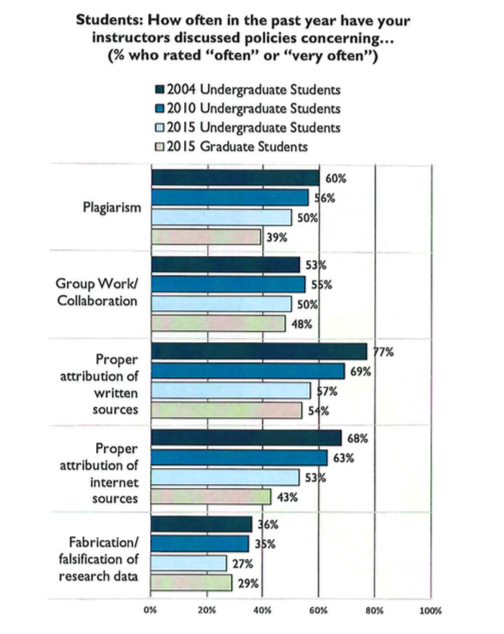BYU students and professors feel confident in BYU’s academic integrity policy, despite faculty and students reporting learning less about the policy.

BYU requires students to sign its academic integrity policy along with the Honor Code and provides a testing center for students to take tests under supervision.
“Compared to 2004 and 2010, faculty and students in 2015 report learning less about BYU’s academic integrity policies from sources including faculty, students, orientation programs and handbooks,” according to the 2015 Academic Report.
While the report was published in 2015, the acadmicy integrity policy is still a talking point for BYU students and professors.
BYU religion professors Richard Holzapfel and Casey Griffiths trust their students to be honest but still take measures to ensure students understand the academic integrity policy.
“I’ve taught at other universities in addition to BYU, and my thought is that certainly there is academic dishonesty occurring at BYU, but not at the level of other universities,” Holzapfel said. “I think my experience has been that it happens, and that’s why we purposely tell them what we’re doing and we’re checking on them to try and keep them honest.”
The Testing Center helps students keep the academic integrity policy, according to Griffiths.
“Beyond (using the Testing Center) I don’t do a lot, because I trust my students and kind of expect them to obey the Honor Code,” Griffiths said.
Former Testing Center employee Sylvia Wadsworth said the Testing Center requires students to turn off cell phones and put bags under desks in order to prevent cheating. The Scantrons are labeled and scratch paper is stamped in a different color every day to ensure students won’t cheat during a test, but sometimes cheating still occurs.
“I think it depended on where we were in the semester,” Wadsworth said. “When it’s like closer to midterms or for sure getting close to finals, that’s when it (was) sort of rising a lot more and we caught a few more.”
The UVU Testing Center runs similarly to BYU’s Testing Center, but students are required to turn off their cell phones in front of proctors and must verbally state they’ve read the academic policy, according to UVU student Tanner Neilson.
“In my experience, I’ve been going to school for a full year now, and I actually have not seen or witnessed any cheating going on,” Neilson said.
BYU’s Testing Center expectations are displayed on signs leading into the Testing Center, and professors include the academic honesty policy in their syllabi.
Griffiths and Holzapfel give students a syllabus quiz at the beginning of the semester to eliminate any confusion regarding the academic integrity policy, the Honor Code and any specific class expectations.
“We try to make them fully aware so they can be more thoughtful in their decisions,” Holzapfel said.
Holzapfel said the university makes it easy to incorporate the academic integrity into professors’ syllabi. Despite these measures, Griffiths said students not reading the syllabus and academic policy is a common frustration for professors.
Pre-management major Addison Holder said he feels professors are preparing students and have properly taught him to cite sources in papers, even though copying from an electronic source without footnoting is the number-one way students cheat at BYU.
“I think that teachers understand that the source of cheating is probably unpreparedness, and so teachers are recognizing that and they’re learning how to help students become a lot more prepared for these tests,” Holder said.
Holzapfel prepares students by letting them know in advance what constitutes as cheating, but he also shows his trust in them by allowing them to take online attendance quizzes on their honor.
“I don’t want to tempt students to do something because of pressure ever, so that’s why I put these safeguards in,” Holzapfel said.
The 2015 Academic Integrity report shows students know what the academic integrity policy expects of them, but a significantly smaller amount of them would report cheating.

Holder said he has never been in a situation where he has witnessed cheating and would feel uncomfortable reporting a person to the Honor Code office without talking to the person first.
Ultimately, students have to decide. Professors put trust into students’ hands and try to prevent cheating, but they know there is only so much they can do because it is up to the students to choose, according to Neilson.
The 2015 Academic Integrity report shows a decrease in talking about specific aspects of the academic integrity policy, but Holder suggested professors talk about something else.
“I think if teachers are able to help us just understand the doctrine of integrity and what it means and the consequences of that, I think we’ll be able to be better with our integrity,” Holder said.




